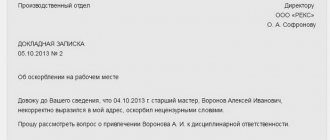Citizens who have experienced harassment in the workplace should explain to the offenders that they can be held accountable for such behavior. Although since 2012 the Criminal Code of the Russian Federation provides for criminal punishment only for insulting a government official , these offenders can be brought to administrative responsibility for insulting in the workplace, in accordance with the provisions of the Code of Administrative Offences.
Dear readers! To solve your specific problem, call the hotline or visit the website. It's free.
8 (800) 350-31-84
Concept and legal characteristics
Article 5.61 of the Code of Administrative Offenses provides for administrative punishment for insult, regardless of the circumstances of the incident.
Actions are considered insulting if two factors are present:
- The offender intended to deliberately humiliate the honor and dignity of the opposing party.
- His behavior, expressions, and gestures were of a distinctly obscene nature.
Consequently, the offense must be exclusively targeted - in relation to a specific person.
A person may be at his workplace and communicating with an irritated client. The customer's complaint cannot be satisfied immediately. He says out loud obscene expressions that do not apply to anyone. This cannot be considered an insult to the employees present. It’s another matter when they are addressed to an individual employee. We must also keep in mind what the offender says and in what manner.
The following point is also important: a person swears and demands a solution to his problem, but does not become specific. The practice of identifying such offenses establishes that an insult is:
- all indecent and obscene targeted statements (swearing, swearing);
- figurative comparisons with certain animals or objects;
- humiliating and indecent touching;
- undignified gestures.
In each individual case, the composition of the offense is important. It is necessary to clearly distinguish the presence of intentionality.
A man at work was offended by a statement. This does not mean that an offense has taken place. Here you can encounter the problem of people's personal perception. It is necessary to distinguish a simple unintentional insult from a malicious targeted action. The second and third parts of Article 5.61 consider precisely the qualified type of offense. The second part relates to public insult, and the third is about the thoughtfulness of such actions.
Structure of a report for an employee
A memo about an employee’s boorish behavior, like any other memo, should include:
- information about the originator of the document;
- information about the recipient of the document, the employee to whom it is addressed;
- a description of the essence of the employee’s disciplinary offense;
- recommendations of the compiler of the memo to management regarding subsequent personnel decisions.
The memorandum must indicate the date the document was generated, as well as the signature of the originator.
Types of insult
Article 5.61 divides insults into public and non-public.
In the workplace, abuse can be constant and everyday. Especially in large manufacturing enterprises, employees insult each other a lot during work. Insults can also be heard from superiors towards subordinates. Workers can also be offended by other people—clients or customers.
If the insult is expressed verbally, then you need to understand whether it can be considered indecent. All this must be kept in mind when drawing up a statement regarding an offense.
The insult can be expressed using ordinary everyday words, but the essence of the statement can be extremely indecent.
Drawing up a complaint
Resolving the issue of insulting citizens in Russian conditions is very problematic. Every day, millions of citizens insult each other at work. We must admit that this phenomenon has become part of the life of Russians. This problem is clearly expressed in the boss-subordinate pair. Even if some companies have special corporate communication codes enshrined in employment contracts, citizens do not feel fully protected.
A person often does not have the opportunity to defend himself from an offender, especially if the offender is his boss. But this does not mean that you should give up and do nothing.
An insult statement is drawn up in compliance with certain rules.
A workplace harassment complaint must contain the following information:
- date and place of the offense;
- specific culprit;
- a detailed description of his actions;
- petition for punishment of the perpetrator.
It is necessary to detail all the actions of the culprit. It is necessary to justify why his actions are understood as an insult.
Whipping boys
Transport company driver Igor recently got a new job and unexpectedly became an outcast. As it turned out, the company had an unspoken tradition: drivers and auto mechanics go to the nearest bar to celebrate the end of the working day. Igor doesn’t like drinking, so at first he refused, and then simply began to go home. Colleagues did not forgive such behavior.
“The guys began to constantly tease me, and if I need help, they refuse me for various reasons,” says Igor. — In fact, I was left at work alone.
32-year-old Sergei works as a manager in a bank in the capital, and he has problems with weight. Everything would be fine, but most of his colleagues are obsessed with fitness. This is the main group in the bank, but Sergei is barred from joining it.
“When we have some kind of movement, they don’t call me anywhere,” Sergei sighs.
Moreover, his colleagues constantly tease Sergei about his weight and the fact that he does not take care of himself. This story has been going on for several years. Sergei began to sleep poorly, in the office he tries to avoid meeting “sports” colleagues, and after work he tries to leave the bank as quickly as possible.
“In the case of Sergei, even if he is not a sports person, he can be respected because he has his own opinion,” comments family psychologist Olga Torletskaya. “However, Sergei should not oppose himself to the team. He could come up with a motto or “chant” for his colleagues, which would certainly make him a full member of their team, even without going to the gym.
According to Olga, Igor’s case is more complicated. The instinct of self-preservation is stronger than all social ties. If he has health problems, it is better for him to really not drink. But Igor should not judge his colleagues: he should probably talk to them more often, share his attention - during the same lunch break. And then, perhaps, his absence in the evening in the company will not be so noticeable.
Still from the film “The Devil Wears Prada” / © Kinopoisk
Guli, an employee of a Moscow logistics company, also has her own story.
“I moved to Russia from the former CIS country,” says Gulya. — How fed up I am with the nagging at work about my nationality! I like to wear long skirts and prefer bright accessories. Colleagues invariably like to go for a walk on this occasion. There is real bullying going on: they make fun of my accent, mentality, faith - and this is the most painful thing. There are no complaints from my superiors about my work, but bullying from employees interferes with my work and life.
People can get bullied by colleagues completely unexpectedly. For example, a team can “unite” against an “extra” employee who needs to be kicked out in order to share his rate. Or this situation: two employees were in a romantic relationship that ended, and one of the partners, for example, was overcome by jealousy and resentment. In this case, he will do everything to annoy his former lover - for example, turn the team against him. There are other situations.
“I would never have thought that I would be an object of ridicule,” admits accountant Valentina. “But, since my age has exceeded 60 years, young employees began to call me “Baba Valya” behind my back. This is incredibly touching! Yes, I am proud to be a grandmother of three grandchildren. Maybe you shouldn’t have told your colleagues about them so often? Maybe that's why I earned this nickname...
Collective conspiracy
Still from the film “The Devil Wears Prada” / © Kinopoisk
— Mobbing is any systematic persecution that humiliates a person in one way or another. That’s why the prevalence of this phenomenon in the corporate environment is actually wider than is commonly talked about,” comments psychotherapist, Doctor of Psychology, Candidate of Medical Sciences Mark Sandomirsky.
According to him, mobbing, for example, may include spreading defamatory rumors about an employee. The reason could be anything - health, accent, appearance, behavior and even the dishes he prefers during lunch. Colleagues may bully an outcast at work and “forget” to invite him to corporate and other socially important events. They make it clear to the person in every possible way that he is a stranger here.
— However, mobbing is not only a direct insult, but also an indirect one. It can be expressed, for example, in emphasized courtesy - the so-called elfing, continues Sandomirsky. — One way or another, the social inadequacy of the behavior of an individual person who is the target of mobbing is emphasized.
According to some reports, 10 percent of employees become victims of mobbing. How dangerous is this phenomenon on such a scale?
Finish off the weak
Photo © Shutterstock Inc
“Of course, mobbing, contrary to the erroneous opinion, does not in itself give rise to suicide, because the latter is the result of an internal psychological imbalance that has existed in a person for a long time,” explains Mark Sandomirsky. — Mobbing simply reduces a person’s work efficiency and leads to an exacerbation of various psychosomatic diseases: more and more often such an outcast goes on sick leave.
As a result, either the following scenario: a person “survives”, he leaves for a new place - by the way, sometimes leaving your current job can even be useful for your career. Or the second option: the persecuted person turns into a habitual victim, having the psychological scenario “scapegoat”. That is, he himself has resigned himself to his fate, and even newly arrived employees who are not in cahoots with the “old ones” begin to “scoff” him.
“But if a person moves from job to job and everywhere there is the same similar story, then this is not mobbing, but the person’s own psychological problems, the responsibility for which he is trying to shift to others,” summarizes Mark Evgenievich.
Mobbing is gender universal - a purely male and purely female version is possible. According to psychologists, work colleagues sense a person’s weakness and begin to hit where it hurts.
— In a women’s group, a man can more easily become a victim of mobbing if, for example, his mother was oppressive in his family. He takes such psychological aggression for granted,” Sandomirsky argues. — Any mobbing is based on the mechanism of an inferiority complex. A person is oppressed and offended precisely because he is inclined to be offended. He feels different from everyone else and initially imagines himself humiliated.
Bullying in law
Insulting a person is defined by Russian legislators in regulations as humiliation of the honor and dignity of a person, and it must be expressed in an indecent form. However, in practice, it is not always possible to figure out in which case it is an insult and in which case it is expressing one’s opinion in a fairly tough company.
Since the beginning of 2012, insulting a person has become a misdemeanor rather than a crime. It is provided for in Article 5.61 of the Administrative Code, or rather in its three parts: for personal insult itself, for public insult and for failure to take measures to prevent public insult. The violator faces a fine of up to three thousand rubles.
Defense against attack
Still from the film “Patients” / © Kinopoisk
In the West, they have learned to fight corporate mobbing - this is done by personnel services. For Russia, this phenomenon is still new, so they often do not react to it in any way.
Psychologists advise increasing the individual stress resistance of a person who has become a target of mobbing.
“It is achieved through various group and individual psychological trainings,” continues Mark Evgenievich. — The victim of mobbing must first of all engage in a systematic increase in self-esteem.
According to him, there are a number of psychological techniques for this: you need to praise yourself and learn to accept praise; emphasize your merits and advantages; do not criticize yourself, at the same time admit real mistakes; create your own support group - on social networks or just among friends.
Secondly, in order to free yourself from the negative emotions caused by mobbing, a person who finds himself a victim must master the skills of practical relaxation.
Third: the victim needs to learn to create the appearance that she is in no way influenced by these aggressive manipulations.
“If you have been insulted by colleagues, you should write a memo to your management outlining the circumstances of the incident,” advises David Dziov, secretary of the Cornerstone recruitment agency. - If you have witnesses who can confirm the fact of your insult, that’s just great. In this case, the employer himself can take action and impose a disciplinary sanction in the form of a reprimand on the offender.
Lawyers also advise not to be afraid to file a police report.
— There is liability in Russian legislation for libel and insult. For this, a person can raise the question of bringing the offender to administrative responsibility,” lawyer Alexey Mikhalchik shares his experience. — For proof, you can stock up on audio or video recordings. In my opinion, the victim could use the help of a psychologist so that he can pull himself together and be able to resist the bullying.
Alexey Mikhalchik noted that Article 128.1 of the Criminal Code (“Slander”) provides for a fine of up to 500 thousand rubles or in the amount of wages or other income of the convicted person for a period of up to six months, or compulsory work for a period of up to one hundred and sixty hours.
Source: https://life.ru/t/%D0%BE%D0%B1%D1%89%D0%B5%D1%81%D1%82%D0%B2%D0%BE/1165133/tierrarium_na_rabotie_kak_zashchititsia_ot_travli_kolliegh
Submitting an application
Most organizations establish a set of rules for polite employee relations at the level of employment contracts and other documents. Cases of violation of these rules may be the subject of discussion with the heads of institutions.
However, when the incident cannot be resolved by the management of the enterprise, the intervention of law enforcement officers is necessary. The provisions of the Code of Administrative Offenses contain Article 28.4, which states: the prosecution of cases under Article 5.61 is carried out by the prosecutor. Experienced lawyers also advise drawing up a statement addressed to the prosecutor's office.
Citizens have the right to file a claim directly in court. In this case, it is necessary to prepare the evidence base of the case in advance, that is, to find witnesses who are ready to testify directly in court.
In circumstances where the culprit of the incident is the boss, it is difficult to rely on the testimony of employees. Then you will have to prove your case yourself, for example, using recordings from office video cameras.
Verbal abuse can be confirmed by a high-quality voice recorder recording. When transmitting this evidence to the court, a written transcript of the recording is required (not required if the playback quality is excellent).
Possible consequences for the conflict initiator
An administrative violation entails an administrative penalty for insulting a person – a fine. According to Art. 5.61 of the Administrative Code, the fine is:
- for citizens – up to 3 thousand rubles;
- for officials – up to 30 thousand rubles;
- for legal entities – up to 100 thousand rubles.
You can learn about administrative liability for the instigator of a conflict who insults his colleague by watching the video
In addition, in accordance with the collective labor agreement, other measures of influence may be provided for the violator who committed the insult. This could be a fine, deprivation of a bonus, an entry in the work book, etc.
Want more information? Ask questions in the comments to the article









